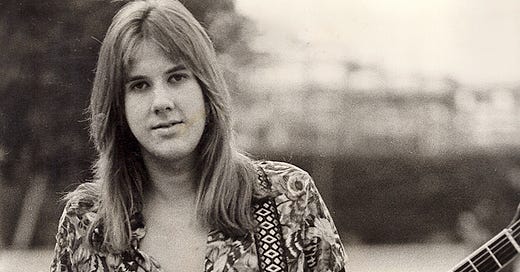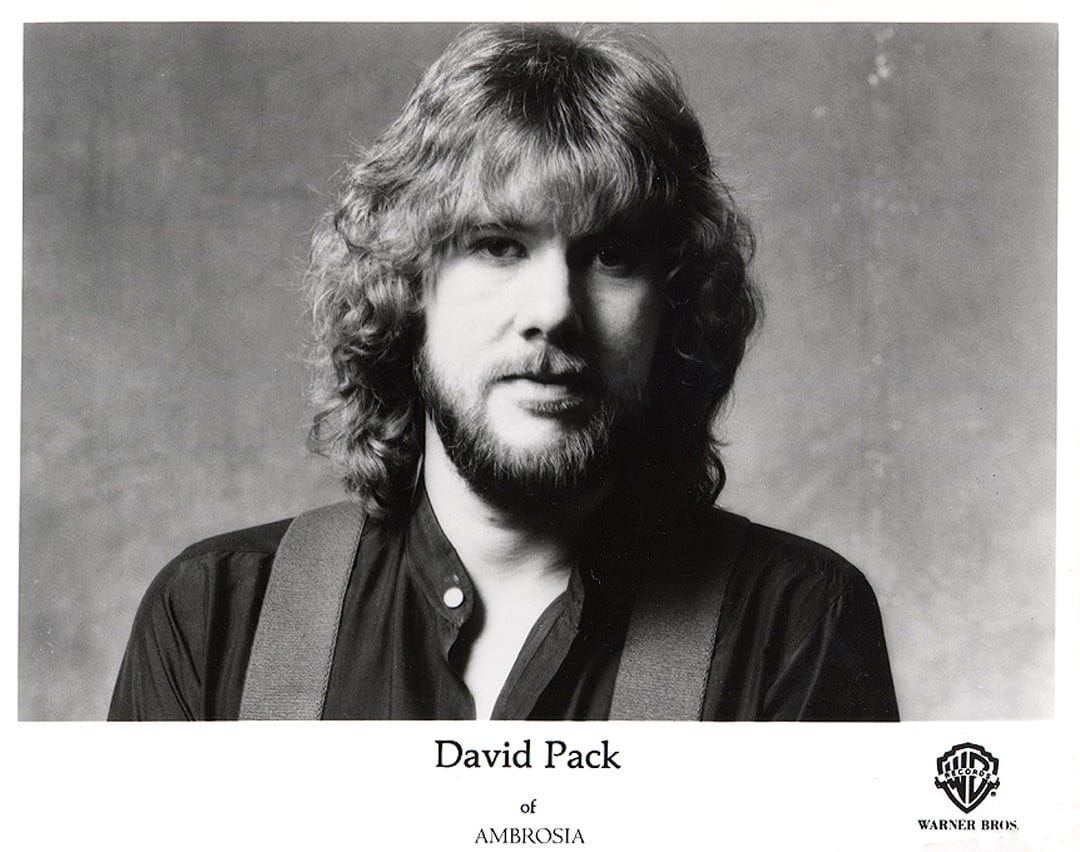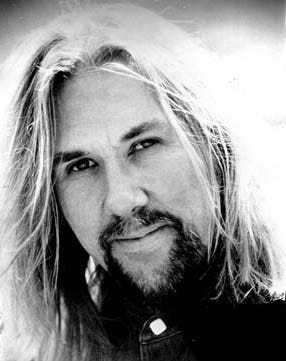Audio Autopsy, 1985: Ambrosia Singer/Guitarist, David Pack Solo LP, "Anywhere You Go"
It's the coulda-been Yacht Rock classic no one heard. With guests Michael McDonald, Toto's Jeff & Mike Porcaro, Jennifer Holliday, Tubes' Prairie Prince, Kansas's Kerry Livgren & Stanley Clarke!🤯
“Anything David touches, he elevates, and that’s a true gift from God.”
— Quincy Jones
In 1985, I was in college at age 30, taking a sharp, career left turn (don’t worry…I signaled). Somehow, I got my hands on the cassette by a guy I knew was the singer/guitarist from Ambrosia, David Pack, and his debut solo album.
Early on in his Ambrosia stint, he joined my list of personal fave-singers-that-no-one-really-knows, elbowing his way just ahead of (Grass Roots’) Rob Grill, Tony Burrows, the Babys’ John Waite, Pat Upton, and (The Quick, Great Buildings, Rembrandts) Danny Wilde.
Ambrosia: More Than Just Cool Whip, Coconut & Pecans
Formed in L.A. in 1970 (the year Pack graduated from L.A. county’s Torrance High School, the alma mater of Ratt drummer, Bobby Blotzer), Ambrosia failed to wow Herb Alpert (or Jerry Moss, for that matter) for an A&M contract, settling, instead for 20th Century Records, who released two albums, the first in 1975.
They landed a couple hits, one on AM, the Top 20 “Holdin’ On to Yesterday,” as well as a nifty slice of FM prog (which I did my part to make a ‘75 hit on Houston’s CBS affiliate, KLOL-FM), “Nice, Nice, Very Nice,” with music written by band members, using lyrics from a poem in Kurt Vonnegut’s Cat’s Cradle (with lead vocals by bassist, Joe Puerta):
Ambrosia’s self-titled debut album was nominated for a Grammy for Best Engineered Recording (non-Classical). Alan Parsons, the mix-down engineer for that album became the producer for their second, 1976’s Somewhere I’ve Never Traveled.
All four members of Ambrosia, then (Pack, bassist Joe Puerta, keyboardist Christopher North, and the drummer with the improbably fabulous name, Burleigh Drummond), played on the first Alan Parsons Project album, Tales of Mystery and Imagination (also on 20th Century Records), which was recorded soon after Ambrosia’s debut.
Incredibly, Alan Parsons was employing Ambrosia in toto (recorded July 1975 through January ‘76) simultaneously with the use, by Boz Scaggs, of virtually all of Toto on his 1976 Silk Degrees album (recorded September and October ‘75), which we covered, at length, recently:
Pack later appeared on the Alan Parsons album, 1993’s Try Anything Once, co-writing, playing, and providing vocals on three songs. But, we’re getting ahead of ourselves!
In 1982, Ambrosia released their fifth and final album, Road Island. It sputtered commercially, and the band broke up. Their last three albums were released by Warner Bros. Records, who were happy and proud to carry Pack’s ‘85 debut solo:
So much so, in fact, the label’s longtime chairman and CEO, the late Mo Ostin, and equally-longtime Warner president, Lenny Waronker, served as Executive Producers on the project!

Killer Songs, Million-Dollar Players, and Major Dough-Mo! Why No Hits?
That doesn’t happen everyday, getting buy-ins from the label to the degree where the execs wanna slap their names on the liner notes’ credit list. Generally, in filmdom, EPs are the ones who bring the money to a project to make sure it gets filmed.
For this degree of up-front-ness, Ostin and Waronker had to have such a degree of faith and confidence for Pack to produce one or more hits, they alone ponied up the dough to pay for studio time (and likely called in a couple favors, contributing to the stellar guest line-up):
Pack’s Anywhere You Go star-studded guest list included Michael McDonald, Toto’s Mike and Jeff Porcaro, The Tubes’ drummer, Prairie Prince, Kansas’s Kerry Livgren, John Elefante (Kansas, Mastedon, Guardian), Broadway’s early-‘80s Dreamgirls star, Jennifer Holliday, and popular session players, James Newton-Howard and Ernie Watts.
Also on the album is the late singer/songwriter, James Ingram, who co-wrote (with Pack and McDonald) one of the catchiest songs on the album, “She Don’t (Come Around Anymore).”
Ingram (and his style) was the intended interpretation “target” of FR&B contributor, Stephen Michael Schwartz, and fellow singer/songwriter (and friend of FR&B), Jay Asher:
In the late ‘70s, Schwartz and Asher collaborated on writing “Only Everyday,” an original song they were hoping would be found and recorded by an artist (in this case, Ingram would’ve been the perfect match for this heartfelt song) searching for material. To that end, the songwriters enlisted Jay’s friend, Clint Holmes (former Epic/CBS recording artist), to sing on the demo.
That fully-produced and rarely-heard demo (with Holmes singing) can only be found exclusively in the following FR&B article:
Back to Pack
The album actually contained three charting singles: One of the tracks, “Prove Me Wrong,” was used in the 1985 Columbia Pictures theatrical musical/dance drama, White Nights (a Gregory Hines/Mikhail Baryshnikov starring vehicle).
The movie was noteworthy for the dancing of Hines and Baryshnikov, as well as for the Academy Award-winning song “Say You, Say Me” by Lionel Richie in 1986, and the #1 hit, “Separate Lives,” performed by Genesis singer/drummer, Phil Collins, and Marilyn Martin, and written by Stephen Bishop (also nominated).
Why Things Didn’t Click
Despite the apparent wind-at-his-back from Warner Bros., Pack revealed, in a 2001 interview with TheParsonsDay, how several things need to come together, not just for a hit album, but to have any success with even one song as a single:
“The reviews were terrific,” David remembered. “The timing of the release was not the best. Sometimes timing is everything no matter how good the product. I was upset that the first single was the song that got added at the last minute: ‘Prove Me Wrong’ from the movie White Nights.
“It was a ‘dance piece’ I composed for Baryshnikov and Hines…NOT a hit song. I knew that, but Warner Bros. didn’t” [Editor’s note: An educated guess suggests that Columbia Pictures approached Warners for a song to be included in the picture. Seeing mass exposure in the film and its attendant soundtrack album (not to mention dollar signs), we can surmise Ostin and Waronker got a little eager to push a song for all the non-artistic reasons].
“It sort of ruined the ‘buzz’ for the rest of the CD that I’d spent a year carefully crafting,” David concluded. “I’m still happy with the record, however. I Just Can’t Let Go, the trio song for James Ingram, Michael McDonald, and I, still sounds fresh to me.”
Pack, Track by Track
“Prove Me Wrong” (Side 2 #3, or Playlist song # 8, written by Pack and keyboardist, James Newton Howard, the track features Toto drummer Jeff Porcaro) was Pack’s only solo entry onto the U.S. Billboard Hot 100, peaking at number 95. Pack also contributed keyboards as well as a blistering guitar that moves it from its beginning balladry to rocker and back again.
How this relatively innocuous track broke the Hot 100 is a mystery (except for its inclusion in a movie and a soundtrack), when the album has, easily, a half dozen other songs which could’ve chart-performed much better.
“I Just Can’t Let Go” (Track #2, written by Pack, he, Ingram and McDonald provided and arranged harmony vocals) is a beautifully fitting ‘80s ballad that features Pack on guitar and bass synth, with Drummond on drums and Ernie Watts on sax.
This original 1985 recording by McDonald, Ingram, and Pack, was re-mixed & re-mastered to create this recent video, as David’s moving tribute to James Ingram:
“That Girl Is Gone” (#5), as “I Just Can’t Let Go” did, placed in the Top 20 on the U.S. Adult Contemporary (AC) chart. Written by Pack, and featuring Puerta on bass and backing vocals (and Drummond drumming), the ballad sounds like it would have fit nicely in an Ambrosia set.
Hooks A-Plenty
Lest the majority of those who heard these three fine tunes in the mid-’80s think Pack was/is simply a ballad-writer (where he, granted, had started to lean with several Ambrosia hits), the bulk of melodic bangers on this album are decidedly upbeat, like the lead and title track, “Anywhere You Go”:
Written by Pack, veteran session keyboardist (mainly synth)/producer, Jai Winding, and bassist, Mike Porcaro, The Tubes’ Prairie Prince adds booming drums. Winding and Kansas’s Kerry Livgren contribute keys, while Pack delivers all the ringing guitars throughout (and solo), as well as drum programming the Oberheim DMX, which found a home on many ‘80s albums:
The title track is also an introduction to Pack’s elastic voice, as he delivers the verses with urgency, plus his falsetto gets a work-out in the chorus and especially toward the end.
The bridge breakdown 2/3 through is an arrangement wonder: Echoing guitar soloing leads into a chilling pick scrape to an immediate tempo increase, and back to the chorus, capped off by Pack’s stratospheric falsetto and ending guitar solo.
Track 3, “Won’t Let You Lose Me,” a serviceable upbeat tune, is notable for its writing credit: Pack, James Newton Howard, and Randy Goodrum. Goodrum, a 75-year-old native Arkansan, has written #1 songs in each of the four decades since his first #1, 1978’s Grammy-nominated (for Song of the Year, a songwriter’s award) “You Needed Me.”
Three years before Pack’s sessions, Goodrum signed a worldwide publishing deal with CBS Songs. His credits expanded, then, to include writing best-selling records in disparate genres including R&B (Patti Austin, El DeBarge), jazz (George Benson, Al Jarreau) and rock (Michael McDonald, Chicago, Toto). Randy, who has released six solo albums, was inducted into the Nashville Songwriters Hall of Fame in 2000.
The Song That Could’ve Driven the Album
A soundtrack’s ballad notwithstanding, Side Two’s leadoff track might just have been the song to give the album the “buzz” Pack thought was missing when “Prove Me Wrong” proved Mo and Lenny…well, not correct.
Pack, Ingram, and McDonald wrote “She Don’t (Come Around Anymore),” with Pack and James Newton Howard sharing keyboard and bass synth chores. (McDonald co-hort) George Perilli propels the song with thunderous drums, and McDonald delivers a terrific lower harmony on the chorus.
“Do Ya”
Not to be confused with the song of the same title by The Move/ELO, K.T. Oslin, Jump5, or anyone else, this “Do Ya” was written by Pack and Jamie Bernstein, and brings a bit of da funk to the album. You’ve gotta wait til the end of the song to hear Jennifer Holliday’s soaring wail, but Stanley Clarke’s well-known bass makes its presence felt throughout.
Kerry Livgren handled the guitar solo, while veteran session percussionist, Paulinho Da Costa, supplemented John Robinson’s (Rufus, Quincy Jones, MJ) drums, and David “Hawk” Wolinski (Rufus) programmed the Emulator II:
David Pack released three more solo albums after Anywhere You Go:
Unborn (2004)
The Secret of Movin’ On (2005)
David Pack’s Napa Crossroads (2014)












“Major Dough-Mo” - off the charts for punniness, Brad!!
Always appreciate the research that highlights all the intersections that confirm the more or less insular nature of the “biz”. Talent appreciates talent, I suppose, but talent doesn’t always guarantee commercial success. Tough business.
This doesn't exactly have anything to do with the main point of your piece- I seem to always be inspired to go off on a tangent by your writing, which I hope is a compliment (it's intended that way)- but the mention of Kansas got me thinking about something. My wife's ex-father-in-law was an original founding member of Kansas. He left before the band got really big, though I think he might have some writing credits on some of their early albums. In the meantime, he's become kind of a local legend in NW Missouri and NE Kansas, where he's made a nice living for the last 50 years as a touring solo act. I've known about him my whole life, seen him play several times, and like I said, even married his oldest son's ex-wife, but until I was reading your article, I'd never really thought about how he would make for an interesting subject for a write-up himself. I'm sure he's had a few small town newspaper profiles done on him over the years, but it would be interesting to go in-depth, to explore the reasons he left the band and his feelings on leaving right before they hit the big time, and how he feels about the nice life and career he carved out on his own. I apologize if all I'm doing is brainstorming in your comments section. I don't know if it fits in exactly with what your newsletter does, but I bet you could do the story justice if you were so inclined. If not, maybe I'll give it a shot if I ever branch out into writing music. But yeah, I guess this is a long-winded way of saying I enjoyed your piece, and that it definitely got me thinking.